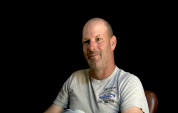6:38 | In Robert Walton's unit, there was a soldier who was held back from deploying to Iraq for medical reasons. He appealed and was able to join the rest of the outfit in Iraq. He wasn't even there a week when tragedy struck. For Walton, the war just got personal. (Caution: Graphic Descriptions)
Keywords : Robert Walton Iraq Victor Anderson convoy Humvee Improvised Explosive Device (IED) body parts volunteer Iraqi

He was a troubled youth, but Robert Walton thought his life might turn around in the Army. His GED wouldn't get him on active duty, but the National Guard was an ideal starting point. He was a talented mechanic, so he came in as a heavy equipment mechanic with an engineering company.
Going from the National Guard to active duty was difficult for Robert Walton. First, they wouldn't count his Guard experience toward promotion. Then, there was an abusive NCO. He had some good training experiences in Egypt, but, when his term was up, he went to work for Halliburton KBR.
He put his mechanical expertise to work in Afghanistan for Halliburton KBR, but Robert Walton returned to the Army with the Georgia National Guard and prepared to deploy to Iraq. He had grueling desert training in California, and then encountered an NCO who set his mind straight.
He was no longer in an engineer company, he was in the infantry, now. Robert Walton deployed to Iraq with a Georgia National Guard unit. At Camp Stryker, it took only a week before getting hit with rocket fire.
When running convoys in Iraq, Robert Walton was a gunner on a Humvee. On his first mission, a local civilian in a Mazda took off at high speed and the commander gave chase. He tapped Walton on the leg and said, "Stop him!" The training kicked in.
During Robert Walton's first deployment to Iraq, the soldiers' hands were not yet tied by the government. They were freely able to eliminate threats. He lost his first friend in a Bradley rollover accident. He was in the vehicle and it was his first big scare.
The power plant was supposed to be clear, but when Robert Walton was walking through, he heard voices nearby and they weren't speaking English. It turned out to be not much of a threat. What was a real threat in Iraq was the huge amount of munitions stockpiled by the insurgents to use in IED's.
During his first deployment to Iraq, Robert Walton saw a gradual change in the populace. The people became less hostile and more welcoming, sharing meals and information on insurgents. It was still very dangerous, with convoys being hit with IED's every day.
Being home after a year and a half in Iraq was good, at first. But Robert Walton wasn't ready to deal with civilian life, so he secured a place in a different National Guard outfit and did an individual mobilization from home, joining the unit in Iraq.
During his second deployment to Iraq, there was the same danger from IED's, but Robert Walton had to deal with a new problem. His own military leadership had decided that there would be strict rules of engagement going forward. Not only that, but a financial shakedown of Iraqi vendors was creating more terrorists.
His second tour was coming to a close when Robert Walton was approached by a sergeant major from a California National Guard unit that was coming over to Iraq. Would he be interested in extending with them? His knowledge of the Iraqi roads and his combat experience were highly valued.
He extended in Iraq to help a green unit get on it's feet, agreeing to two months. Robert Walton ended up staying for a year. He had a job to do. When he returned home, it was only a few months before he decided to volunteer yet again. The civilian world did not have the structure and discipline he craved.
Why would you volunteer for a fourth combat tour? For Robert Walton, one reason was the illogical world of civilian hiring. He possessed many qualifications and certifications, but they weren't good enough because they were in a military setting.
Four combat tours and he knew he was done. Robert Walton needed to spend time with his ailing parents and he needed to start dealing with his PTSD. What he didn't need was the static he was getting from the VA.
As if four combat tours weren't enough, Robert Walton went to a Georgia National Guard unit to train new soldiers. It was one last chance to pass along his knowledge and experience to the Army he loved.